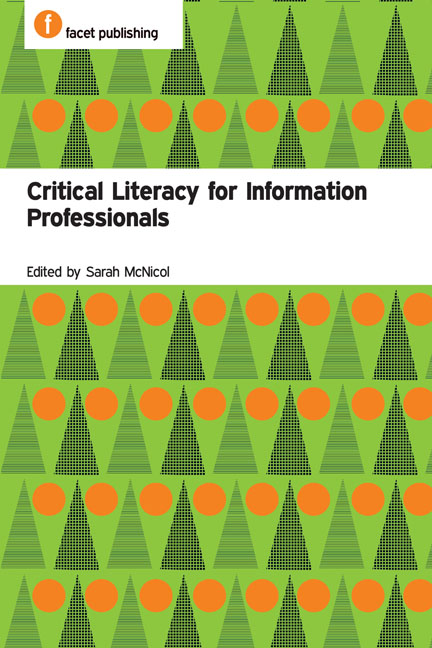Book contents
- Frontmatter
- Contents
- Contributors
- Introduction
- PART 1 THEORIES OF CRITICAL LITERACY
- PART 2 CRITICAL LITERACY IN PRACTICE
- 8 A picture is worth a thousand words: teaching media literacy
- 9 Curricular and extra-curricular opportunities to engage school students in critical literacy in England
- 10 New media and critical literacy in secondary schools
- 11 Critical literacy and academic honesty: a school librarian's role and contribution
- 12 Engaging undergraduate communications students in critical information literacy
- 13 Exploring pedagogical implications of students’ search mediation experiences through the lens of critical information literacy
- 14 Diffusing critical web literacy in a teacher-education setting: initial reflections and future planning
- Further information
- Index
9 - Curricular and extra-curricular opportunities to engage school students in critical literacy in England
from PART 2 - CRITICAL LITERACY IN PRACTICE
Published online by Cambridge University Press: 08 June 2018
- Frontmatter
- Contents
- Contributors
- Introduction
- PART 1 THEORIES OF CRITICAL LITERACY
- PART 2 CRITICAL LITERACY IN PRACTICE
- 8 A picture is worth a thousand words: teaching media literacy
- 9 Curricular and extra-curricular opportunities to engage school students in critical literacy in England
- 10 New media and critical literacy in secondary schools
- 11 Critical literacy and academic honesty: a school librarian's role and contribution
- 12 Engaging undergraduate communications students in critical information literacy
- 13 Exploring pedagogical implications of students’ search mediation experiences through the lens of critical information literacy
- 14 Diffusing critical web literacy in a teacher-education setting: initial reflections and future planning
- Further information
- Index
Summary
Introduction
Ensuring that pupils are provided with opportunities to engage in authentic tasks that require them to develop their information literacy skills is a key issue for the school librarian. However, many information-literacy models currently available (e.g. Big6 and PLUS) tend to emphasize the process skills of searching, locating and retrieving relevant information rather than requiring users to challenge or question the underlying ideology of the information itself by ‘reading texts in an active, reflective manner in order to better understand power, inequality, and injustice in human relation - ships’ (Coffey, 2015). This chapter identifies opportunities to engage school students in critical literacy that take place either within the curriculum or as extra-curricular activities.
In schools in England the school librarian's input into teaching and learning can be variable and depends on the ethos of the institution and the strength of staff working relationships. Those librarians who are able to collaborate with teaching staff to design lessons and projects can have direct input into the range of skills that are included in the learning process. In other cases, however, pupils’ use of the information that they find during a research lesson or for homework can predominantly lie in the domain of the teacher, which means that it can be challenging for the librarian to work with pupils outside of locating and recording information.
In England, the majority of state-funded schools follow a national curriculum which, in its current version, is widely viewed as placing greater emphasis on the acquisition and application of knowledge and concepts than on the skills of critiquing the underpinning values and power structures and socially constructed concepts. While within the national curriculum pupils interact with a range of texts including course textbooks, selected additional reading from both traditional and online sources and material that they locate themselves, the emphasis on knowledge building within subjects means that the use of textbooks and worksheets is often seen as the most effective way of delivering the curriculum in a reliable and consistent manner (Oates, 2015, 6).
- Type
- Chapter
- Information
- Critical Literacy for Information Professionals , pp. 105 - 114Publisher: FacetPrint publication year: 2016



